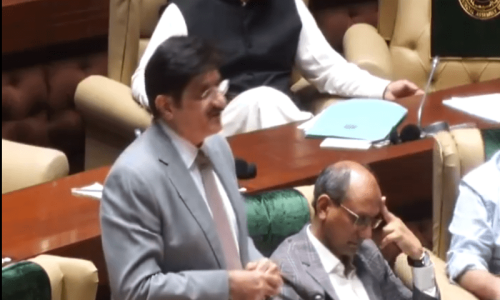KARACHI: Since there is no separate head for children in budget and other relevant documents of the province, there is a need to devise strong legislative frameworks aligned with the Convention on the Rights of the Child, child-specific programmes and their allocation in budget policies and annual development programmes and strongly enforce and implement them.
This was the main message of the discussion on ‘Analysis of child-focused provincial budget allocation/utilisation’ organised by Legal Rights Forum in collaboration with Save the Children and IKEA Foundation at a hotel here on Thursday.
In a presentation by Sumaira Rafi of Save the Children about budget analysis with a child rights perspective for Sindh, it was shown that the total budget of Sindh for 2018-19 was estimated at Rs1,144.45 billion, showing a 9.7 per cent increase over the budget estimates of Rs1,043.185bn for 2017-18. In terms of development budget, the total outlay during 2018-19 was Rs343.911bn, of which Rs252bn was estimated for the provincial annual development programme, showing a 3.28pc increase over the last year. For 2018-19, the education budget is estimated as Rs208.23bn, showing an increase of 14.67pc over the allocations of Rs181.5bn for 2017-18.
‘Which child will be comfortable going to a school where there are no bathrooms, no drinking water?’
The ADP allocation for the education sector, excluding new schemes, has been kept at Rs24.4bn, including Rs3.2bn kept for boards and universities, Rs958.5 million for the Sindh Technical Education and Vocational Training Authority and Rs200m for special education, Rs5bn for college education and Rs15m for school education.
Child rights projects
Besides the provincial ADP, Rs3bn has been allocated for foreign-funded projects of the education department. It is estimated that more than 82pc of the Sindh Education Department budget is allocated for various child-specific schemes and projects relating to child rights.
Other things mentioned in the presentation included more child-specific projects, schemes and activities of the health department for which is allocated a cumulative budget of Rs4,836.649m from the 2018-19 ADP, expenditure of the Social Welfare Department of which Rs163.407m is allocated, Rs200m for the Child Protection Authority, etc. Amir Murtaza, a child rights expert, said that implementation or utilisation of things was a big issue in Pakistan. “That’s how we have not been able to eradicate polio even, because nothing is being done for children here which points to flaws in the system,” he said.
“Through our efforts we were able to set up the Sindh Child Protection Authority. The department is allocated Rs200m annually, too, but that amount lapses every time as there is no utilisation or spending for a protection system for children,” he added.
Imdad Channa, deputy director, Social Welfare Department, said that things were not moving within the government when it came to children because there were no independent or new appointments taking place for the new departments and sections coming up. “The officers who have no training for the job, and hence are clueless, are given additional charges to fill in the positions in new departments,” he said. “The Child Protection Authority really ought to work with the Social Welfare Department for things to work.”
Dr Khalid Iqbal, CEO of the Kharadar General Hospital, also said that not protecting children, who happened to be our future, was like making our future dark. “There are some 73 children with HIV or AIDS in Larkana, there are [several] reported cases of polio, Pakistan has a high infant mortality rate, there is stunted growth and physically and mentally weak children and what not. It is a very serious situation, which calls for serious thought on the budget allocated for children’s health,” he said.
Kapil Dev, head of the Sindh Programme, UN Women, said that things were really bad in most schools where children were walking out because of lack of facilities. “People call it dropping out of school, but I see it as walking out of school. Which child will be comfortable going to a school where there are no bathrooms, no drinking water? And despite so much needed in the schools department, our education budget also lapses year after year,” he said.
‘Nothing is being done’
Justice Majida Razvi, chairperson of the Human Rights Commission Sindh, finally said that she could see all the gaps. “Nothing is being done is the bottom line despite the allocation of funds,” she said. “Be it in education or health, the provincial government has been unable to serve children and so there is lack of hygiene, bad food, dirty tap water that is all taking its toll on our children,” she said.
“Why does the allocated money lapse? It lapses because we cannot manage things properly. It is pure neglect. Why can’t we control simple and basic things? It is because there is no proper administration and no proper coordination and that when you even have money points towards the ill-will of people in control,” she said.
Hameeda Kaleem and Tahir Iqbal of Legal Rights Forum, District and Sessions Judge Shahid Shafiq also spoke.
Published in Dawn, May 10th, 2019














































Dear visitor, the comments section is undergoing an overhaul and will return soon.